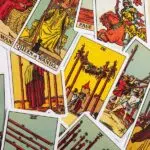The Five of Swords is one of the 78 cards in a traditional tarot deck. It is part of the suit of Swords, which represents the element of air and is associated with intellect, communication, and conflict. The Five of Swords card depicts a scene of conflict and victory, with a figure standing triumphantly over his defeated opponents. This card holds significant meaning in tarot readings, as it represents the complexities and challenges that arise from conflict and the importance of perspective in achieving victory.
In tarot readings, the Five of Swords often signifies conflict, competition, and power struggles. It suggests that there may be tension or disagreements in a situation, and that there may be winners and losers. However, it also reminds us that victory can come at a cost and that it is important to consider the consequences of our actions. The card encourages us to examine our motivations and approach to conflict, and to consider whether we are acting in a way that is fair and ethical.
Table of Contents
Understanding the Symbolism of the Card
The imagery on the Five of Swords card is rich with symbolism that adds depth to its meaning. In the foreground, we see a figure standing triumphantly with three swords in his hand, while two defeated figures walk away in the background. The figure’s posture and expression suggest a sense of smugness or arrogance, indicating that he may have achieved victory through less than honorable means.
The swords themselves also hold symbolic meaning. In tarot, swords represent intellect, communication, and conflict. They are associated with the element of air, which is often linked to rationality and logic. The presence of multiple swords in this card suggests a heightened level of conflict or competition. It also implies that there may be different perspectives or agendas at play.
The Meaning of Conflict in the Five of Swords
The Five of Swords card depicts a scene of conflict, with one figure standing triumphantly over his defeated opponents. This card represents the complexities and challenges that arise from conflict, and the different types of conflict that can be present in our lives.
One interpretation of the card is that it represents external conflict, such as disagreements or power struggles with others. It suggests that there may be tension or competition in a situation, and that there may be winners and losers. This can be seen in the defeated figures in the background, who have chosen to walk away rather than continue the fight.
Another interpretation is that the card represents internal conflict, such as inner turmoil or conflicting desires. It suggests that there may be a battle within ourselves, where different parts of us are vying for control or dominance. This can be seen in the figure standing triumphantly, who may have achieved victory but at the cost of his integrity or moral compass.
The Importance of Perspective in Victory
One of the key lessons of the Five of Swords card is the importance of perspective in achieving victory. The figure standing triumphantly in the card may have won the battle, but at what cost? His smug expression and posture suggest that he may have achieved victory through less than honorable means. This reminds us that winning at all costs is not always a true victory.
The card encourages us to consider our motivations and approach to conflict. Are we acting in a way that is fair and ethical? Are we considering the consequences of our actions? It reminds us that true victory comes not from defeating others, but from finding a resolution that benefits all parties involved. It encourages us to consider different perspectives and to seek common ground.
The Role of Strategy and Planning in Conflict Resolution
The Five of Swords card also highlights the importance of strategy and planning in conflict resolution. The figure standing triumphantly in the card may have achieved victory through careful planning and cunning tactics. This suggests that there is a strategic element to conflict, and that success often comes from being prepared and thinking ahead.
In real life, conflict resolution often requires careful consideration and planning. It involves understanding the different perspectives and needs of all parties involved, and finding a solution that is fair and equitable. The card encourages us to approach conflict with a strategic mindset, and to consider the long-term consequences of our actions.
The Dangers of Winning at All Costs
While the Five of Swords card represents victory, it also serves as a cautionary tale about the dangers of winning at all costs. The figure standing triumphantly in the card may have achieved his goal, but at what cost? His smug expression and posture suggest that he may have compromised his integrity or moral compass in the process.
This card reminds us that true victory is not about defeating others, but about finding a resolution that benefits all parties involved. It encourages us to consider the consequences of our actions and to act in a way that is fair and ethical. Winning at all costs may bring temporary satisfaction, but it often leads to long-term negative consequences.
The Impact of Ego on Conflict and Victory
The Five of Swords card also highlights the role of ego in conflict and victory. The figure standing triumphantly in the card exudes a sense of smugness or arrogance, suggesting that his victory may be driven by ego rather than genuine achievement.
Ego can play a significant role in conflict, as it often leads us to prioritize our own needs and desires over those of others. It can cloud our judgment and prevent us from considering different perspectives or finding common ground. The card encourages us to set aside our ego and to approach conflict with humility and empathy.
The Lesson of Surrender in the Five of Swords
One of the key lessons of the Five of Swords card is the importance of surrender in conflict resolution. The defeated figures in the background have chosen to walk away rather than continue the fight, suggesting that sometimes surrendering is the best course of action.
Surrender does not mean giving up or admitting defeat. It means recognizing when a situation is no longer serving us and choosing to let go. It means releasing our attachment to a particular outcome and being open to new possibilities. The card encourages us to surrender our need to be right or to win at all costs, and to instead focus on finding a resolution that benefits all parties involved.
The Relevance of the Five of Swords in Modern Life
The lessons of the Five of Swords are highly relevant in modern life, where conflict and competition are often present. In a world that values winning and success above all else, it is easy to lose sight of the importance of fairness, integrity, and empathy.
The card reminds us that true victory comes not from defeating others, but from finding a resolution that benefits all parties involved. It encourages us to consider different perspectives and to seek common ground. It reminds us that conflict can be an opportunity for growth and understanding, if approached with an open mind and a willingness to listen.
How to Interpret the Five of Swords in a Tarot Reading
When interpreting the Five of Swords in a tarot reading, it is important to consider its placement in the spread and the surrounding cards. The card can have different meanings depending on its context.
In general, the Five of Swords suggests conflict, competition, and power struggles. It may indicate tension or disagreements in a situation, and that there may be winners and losers. It encourages us to examine our motivations and approach to conflict, and to consider whether we are acting in a way that is fair and ethical.
If the card appears in a positive position or is surrounded by positive cards, it may suggest that conflict is necessary for growth or transformation. It may indicate that there is an opportunity for resolution or understanding if approached with an open mind and a willingness to listen.
Embracing the Lessons of the Five of Swords
In conclusion, the Five of Swords card holds significant meaning in tarot readings. It represents the complexities and challenges that arise from conflict, and the importance of perspective, strategy, and surrender in achieving victory.
The card reminds us that true victory comes not from defeating others, but from finding a resolution that benefits all parties involved. It encourages us to consider different perspectives and to seek common ground. It cautions us against winning at all costs and reminds us of the negative consequences of ego-driven actions.
By embracing the lessons of the Five of Swords, we can approach conflict with humility, empathy, and a strategic mindset. We can find resolutions that are fair and ethical, and that promote growth and understanding. The card serves as a tool for personal growth and a reminder to approach conflict resolution with integrity and compassion.











